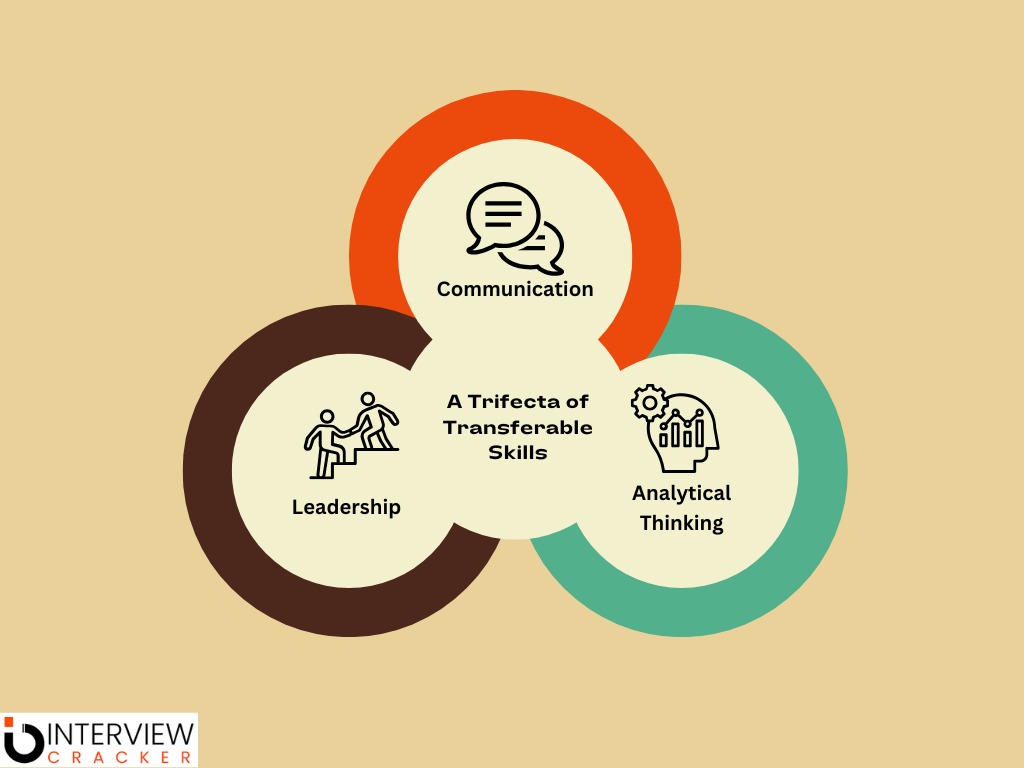Landing a job isn’t just about having the right qualifications—it’s about possessing skills that stand the test of time. As industries evolve and AI takes over repetitive tasks, the demand for human-centric abilities like critical thinking, adaptability, and communication is skyrocketing. I’ve realized that no matter the job title or industry, transferable skills can set you apart, making you a valuable asset in any workplace. Whether you’re switching careers, aiming for a promotion, or just future-proofing your job, these 10 must-have transferable skills will instantly boost your employability.
Table of Contents
ToggleWhat are Transferable Skills?
Transferable skills( or Portable skills) are abilities, knowledge, or competencies that individuals develop that can be transferred from one job to another
These skills can be applied or adapted to different situations, roles, or environments. These skills are not limited to a specific job, industry, or field, making them versatile and valuable across various professional and personal contexts. Transferable skills are often considered portable and can enhance a person’s ability to succeed in different roles or adapt to changing circumstances.
Examples of transferable skills include communication skills, problem-solving abilities, critical thinking, teamwork, time management, adaptability, leadership, and interpersonal skills. These skills are not tied to specific technical knowledge or industry expertise, making them relevant and applicable in diverse situations. As individuals navigate their careers or personal development, transferable skills play a crucial role in their overall success and versatility.
Significance of Transferable Skills
Understanding the significance of transferable skills requires a closer examination of the term. It’s not just about possessing a skill set; it’s about recognizing the intrinsic value these skills hold across various domains. Transferable skills mean having a set of competencies that go beyond the specific requirements of your current position, making you a valuable asset in any professional landscape.
Consider a project manager who excels in communication and leadership. These skills, often overlooked in the narrow scope of job roles, are transferable gems. When this project manager decides to pivot to a different industry, the ability to communicate effectively and lead a team becomes a currency that transcends the boundaries of project management.
Difference between Transferable Skills and Non Transferable Skills
Skills are categorized as either “transferable” or “non-transferable.”
Transferable Skills
Transferable skills are those that can be applied and are valuable across different roles, industries, and situations.
Non Transferable Skills
Non-transferable skills are skills that are specific to a certain job or context and may not be easily applied elsewhere.
Non-transferable skills are highly specialized and specific to a particular job or industry. For example, the knowledge of a specific software program, familiarity with certain machinery, or expertise in a niche area of law could be considered non-transferable skills because they are highly specific to certain roles.
It’s worth noting that the distinction between transferable and non-transferable skills is not always absolute, and many skills can have both general and specific applications. Additionally, the importance of certain skills can vary depending on the job or industry.
Transferable Skills Examples
Let’s delve into concrete examples of transferable skills in action. Picture a software developer who decides to explore the realm of product management. While coding skills may seem industry-specific, the developer’s analytical thinking, problem-solving prowess, and attention to detail are transferable skills that seamlessly transition into the new role. It’s not just about lines of code; it’s about the ability to analyze complex issues, devise solutions, and maintain a meticulous eye for detail.
Adaptability is another transferable skill that stands out in such scenarios. As Heraclitus said, “Change is the only constant in life,” and the professional arena is no exception. An individual’s capacity to adapt to new environments, technologies, and challenges is a transferable skill that remains relevant regardless of the career path
Transferable Skills List

Below are 7 main transferable skills:
1. Communication Skills:
Definition: The ability to articulate ideas clearly, both in written and spoken form.
Example: Crafting persuasive emails, leading effective team meetings, and creating compelling presentations.
Suggested Read: How to improve communication skills
2. Leadership Skills:
Definition: The capacity to guide, motivate, and inspire a team towards a common goal.
Example: Taking charge in a crisis, mentoring team members, and fostering a collaborative work environment.
3. Analytical Thinking:
Definition: The skill of breaking down complex problems into manageable components for effective problem-solving.
Example: Conducting data analysis, identifying trends, and making informed decisions based on available information.
4. Adaptability:
Definition: The ability to adjust and thrive in changing environments.
Example: Successfully transitioning to remote work, embracing new technologies, and quickly learning and applying new processes.
5. Time Management:
Definition: Efficiently allocating time to tasks and projects to maximize productivity.
Example: Meeting deadlines consistently, prioritizing tasks effectively, and optimizing work processes.
Suggested Read: Learn how to manage your Time
6. Creativity:
Definition: Thinking outside the box to generate innovative ideas and solutions.
Example: Designing a unique marketing campaign, proposing creative solutions to business challenges, and contributing original perspectives in brainstorming sessions.
7. Problem-Solving:
Definition: The ability to analyze problems and develop effective solutions.
Example: Resolving customer issues, troubleshooting technical problems, and devising strategies to overcome obstacles.
Building a Resume with Transferable Skills
As you embark on the journey of crafting a resume that speaks volumes about your transferable skills, keep in mind the art of balance. While technical skills are undoubtedly important, a well-rounded resume should also highlight the transferable skills that make you a dynamic and adaptable professional.
Transferable Skills Examples for Resume:
Consider this excerpt from a resume tailored to emphasize transferable skills:
“A seasoned project manager with a proven track record in leading cross-functional teams and delivering projects on time and within budget. Possesses strong communication skills demonstrated through effective collaboration with diverse stakeholders. Known for analytical thinking and problem-solving, with a keen eye for detail. Adept at adapting to evolving project requirements and fostering a positive team environment.”
The Power of Three: A Trifecta of Transferable Skills

Let’s explore three transferable skills that are particularly crucial for a product manager aiming to steer the ship of success in a dynamic market.
Communication:
Effective communication is the cornerstone of successful product management. A product manager must convey ideas clearly to both technical and non-technical stakeholders. As the saying goes, “The art of communication is the language of leadership.” This holds especially true in the fast-paced world of product management, where clear communication can be the difference between a product’s success and failure.
Leadership:
A product manager is the captain of the product ship, steering it through the stormy seas of market competition. Leadership skills are not just about giving orders; they’re about inspiring a team to work towards a shared vision. As John C. Maxwell aptly put it, “A leader is one who knows the way, goes the way, and shows the way.” In the context of product management, this means guiding the team towards innovative solutions and successful product launches.
Analytical Thinking:
Product management is a realm where decisions must be grounded in data and analysis. The ability to think analytically, assess market trends, and make data-driven decisions is a transferable skill that elevates a product manager’s effectiveness. In the words of Albert Einstein, “The important thing is not to stop questioning. Curiosity has its own reason for existing.” A curious and analytically inclined product manager is well-equipped to navigate the complexities of the market.
Real Stories of Transferable Skills in Action
Please take a look at Sarah, a marketing specialist with a passion for data analysis.
Sarah’s story is a testament to the power of adaptability and analytical thinking. Starting her career in traditional marketing roles, she realized the increasing importance of data in shaping marketing strategies. Instead of confining herself to the boundaries of her initial skill set, Sarah embarked on a journey of self-improvement.
She enrolled in online courses to enhance her data analysis skills, and soon enough, her ability to interpret marketing data became her ticket to a role in digital marketing. The transferable skills of analytical thinking and adaptability not only facilitated her career transition but also propelled her toward success in the ever-evolving landscape of digital marketing.
Conclusion: Mastering the Art of Transferable Skills
As you navigate the intricate web of career choices, remember that transferable skills are your silent companions, ready to adapt, lead, and innovate. They are the threads that weave a seamless tapestry across diverse professional landscapes.
In the words of Leonardo da Vinci, “Learning never exhausts the mind.” The journey of mastering transferable skills is a perpetual one, marked by continuous learning and adaptation. Embrace the dynamic nature of the professional world, and let your transferable skills be the compass guiding you towards success.
So, whether you’re a seasoned professional contemplating a career pivot or a recent graduate stepping into the professional arena, recognize the power of transferable skills. They are not just the tools in your toolkit; they are the essence of your professional identity, shaping your success in ways both seen and unseen.
Transferable skills are not mere buzzwords; they are the linchpin of your professional journey. So, equip yourself with the versatility of a Swiss Army knife, the adaptability of a chameleon, and the wisdom to recognize that, in the world of careers, the only constant is change.




